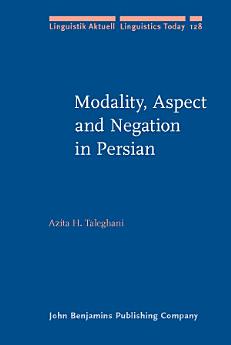Modality, Aspect and Negation in Persian
Azita H. Taleghani
มิ.ย. 2008 · Linguistik Aktuell/Linguistics Today หนังสือเล่มที่ 128 · John Benjamins Publishing
4.0star
2 รีวิวreport
eBook
183
หน้า
reportคะแนนและรีวิวไม่ได้รับการตรวจสอบยืนยัน ดูข้อมูลเพิ่มเติม
เกี่ยวกับ eBook เล่มนี้
This monograph presents a morpho-syntactic investigation on modality, aspect, and negation by concentrating on Persian, and is designed to contribute to theoretical linguistics and the study of Iranian languages. The analysis is based on the Minimalist program. This research challenges the idea that the syntactic structure maps on the semantic interpretation or vice versa. The discussion presented in this monograph shows that the syntactic structure of Persian modals is uniform no matter if the modals are interpreted as having root or epistemic readings. Although it is claimed that modals are raising constructions in different languages, modals in Persian, which does not have subject-raising constructions, show a different syntactic behavior. Furthermore, the structural analysis of the interaction of Persian modals and negation shows that because of the scope interaction of negation and modals, the syntactic structure of modals with respect to negation mostly corresponds to the semantic interpretation of modals.
การให้คะแนนและรีวิว
4.0
2 รีวิว
ให้คะแนน eBook นี้
แสดงความเห็นของคุณให้เรารับรู้
ข้อมูลในการอ่าน
สมาร์ทโฟนและแท็บเล็ต
ติดตั้งแอป Google Play Books สำหรับ Android และ iPad/iPhone แอปจะซิงค์โดยอัตโนมัติกับบัญชีของคุณ และช่วยให้คุณอ่านแบบออนไลน์หรือออฟไลน์ได้ทุกที่
แล็ปท็อปและคอมพิวเตอร์
คุณฟังหนังสือเสียงที่ซื้อจาก Google Play โดยใช้เว็บเบราว์เซอร์ในคอมพิวเตอร์ได้
eReader และอุปกรณ์อื่นๆ
หากต้องการอ่านบนอุปกรณ์ e-ink เช่น Kobo eReader คุณจะต้องดาวน์โหลดและโอนไฟล์ไปยังอุปกรณ์ของคุณ โปรดทำตามวิธีการอย่างละเอียดในศูนย์ช่วยเหลือเพื่อโอนไฟล์ไปยัง eReader ที่รองรับ







